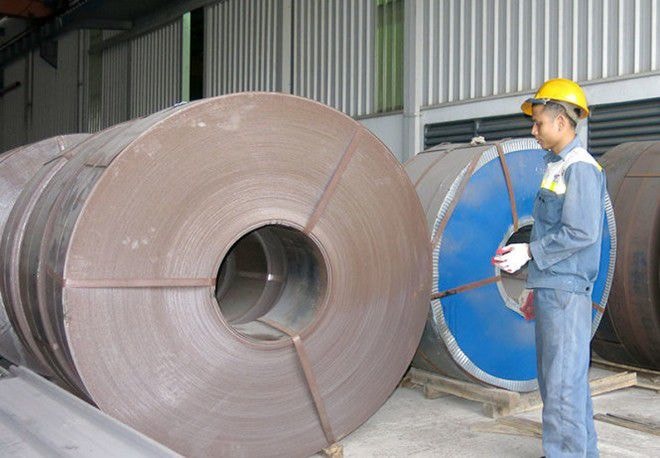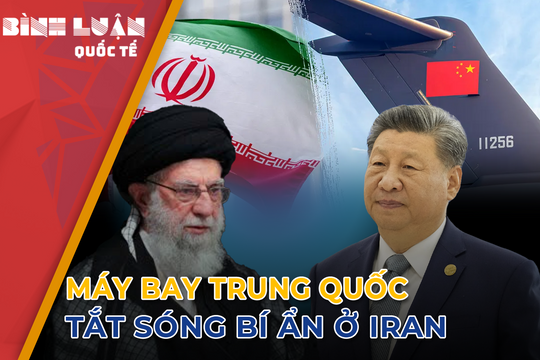Vietnamese steel is attacked by cheap Chinese steel.
Millions of tons of cheap Chinese steel imported into Vietnam in recent times have caused the domestic steel industry to collapse.
Loose technical barriers, lack of quality standards... are the reasons why Vietnamese steel is being "attacked" right at home.
The consequences of this situation not only put domestic steel enterprises at risk of production stagnation, but also sound an alarm bell for construction projects due to the use of low-quality imported steel products.
Import a lot because of cheap price
The director of a steel structure company based in Quang Minh Industrial Park (Hanoi) said that the price of black steel plate imported from China has dropped sharply by 40% in just the past few months, now around 7.3 million VND/ton. This item is mainly used in construction works, factories... The low price has caused the imported quantity to increase rapidly.
In addition to black steel plates, this company also imports galvanized steel coils from China. The price of this item has also dropped sharply, from 12.5 million VND/ton at the beginning of the year to only about 10 million VND/ton, the imported quantity has also increased by 50% compared to the same period in 2014.
 |
The price of black steel sheets and coils imported from China is currently 7,300 VND/kg, equal to 40% compared to the same period last year (photo taken at a steel import enterprise in Hanoi).
The price of black steel sheets and coils imported from China is currently 7,300 VND/kg, equal to 40% compared to the same period last year (photo taken at a steel import enterprise in Hanoi).
In particular, corrugated iron products, a product in which Vietnamese enterprises have an advantage, are also being dominated by corrugated iron imported from China. According to the Vietnam Steel Association (VSA), the amount of corrugated iron imported in 2014 was 750,000 tons, but in September 2015 alone, the import of this product skyrocketed to 1 million tons.
What surprised many people was that the import volume of steel products with "alloy" elements such as steel coils, steel bars, and even steel billets... increased dozens of times, but the average import unit price decreased sharply by 1-2 times compared to the same period last year.
Of which, the deepest price reduction of up to 4.5 times is for alloy steel billet, from over 1,800 USD/ton to now only about 413 USD/ton.
Disguised as "alloy"
Explaining to Tuoi Tre reporters about the "alloy" element in steel products, Mr. P. - general director of a steel company in the South - said: "Even during the production process in China, the manufacturer calculated to remove the boron or chromium element to name it "alloy steel" to enjoy a 0% import tax rate (instead of having to pay 5 - 10% tax depending on the type), but in reality, all of this type of steel when imported to Vietnam is used for construction."
According to this general director, most of the steel coils or alloy steel bars imported to Vietnam are sent to the provinces for consumption in many different forms, with a selling price of only 10 million VND/ton, cheaper than domestically produced construction steel by a million VND/ton.
“Instead of our company winning the bid to supply construction steel to province A, now there will be a trading company supplying this type of steel to go along with traditional construction steel,” he explained.
Regarding galvanized and color-coated corrugated iron products imported from China, Mr. Vu Van Thanh, Deputy General Director of Hoa Sen Group, said that the situation of "don dem", or cheating on the thickness of corrugated iron, has "spread strongly and widely".
“Firstly, the thickness of the corrugated iron sheet is stated on one side, but because it is difficult to measure, they cut the thickness, in some cases by more than 25%. Second is the thickness of the plating layer. The announcement may be AZ70, meaning that 70g of aluminum-zinc alloy will be plated/m2, but low-quality corrugated iron sheets are only plated with 30g or 40g, not to mention the paint quality is not guaranteed,” Mr. Thanh analyzed. Therefore, if the quality corrugated iron sheet has a 10-year warranty, then the fake, low-quality corrugated iron sheet can only be used for 5-7 years at most.
According to the disclosure of a deputy director of another large corrugated iron manufacturing enterprise in the South, there is currently a situation where some small-scale corrugated iron manufacturing enterprises without a brand name on the market have ordered pre-stamped product codes, product symbols, and brand logos of reputable enterprises on the market from China, then imported them to Vietnam and sold them along with branded products.
This situation is very common in the Northern, Central and Central Highlands regions. “When they order, the thickness, plating and paint coverage of the fake products will of course be lower than the standards of reputable businesses so the price will be cheaper,” he informed.
Loose control
Steel industry experts say that one of the reasons for the massive import of Chinese steel into Vietnam is due to loose regulations and technical barriers in Vietnam and weak control and enforcement of regulations.
“The HS code of square billet (regular steel billet) is 7207, with a tax rate of 9%. But if the importing enterprise deliberately declares it as HS code 7224 as alloy steel billet, the tax rate is 0%. The problem here is how can customs know which steel billet is alloy and which is not when looking with the naked eye when both products have the same external appearance? This is one of the loopholes,” the general director of P Steel Company analyzed.
Meanwhile, according to Mr. Nguyen Van Sua - Vice President of VSA, in order to import alloy steel, current regulations require importing enterprises to have their production capacity inspected or to have a trust contract with trading companies.
At the same time, it is necessary to register the imported steel grade for conformity so that the General Department of Standards, Metrology and Quality can assess whether this declaration is in accordance with the registered standards or not. "I think the inspection of the registration of conformity is not done well because the number of alloy steel grades imported from China is currently only about 25 grades. If we want to control it, it is not too difficult because the number of enterprises importing this type is not too many," Mr. Sua frankly said.
On the other hand, according to experts, Vietnam currently does not have a set of national standards on steel quality.
Sharing the same view, Mr. Thanh also said that currently, Vietnamese enterprises exporting iron and steel products to other countries face extremely strict trade and technical barriers from other countries. Meanwhile, in the domestic market, poor quality, fake and counterfeit goods are flooding in large quantities easily and comfortably.
“It is necessary to amend Joint Circular 44/2013 of the Ministry of Industry and Trade and the Ministry of Science and Technology. At the same time, Vietnam needs to apply a national standard, forcing steel products that want to be sold in Vietnam to comply, or in case Vietnam cannot immediately issue a national standard, it can apply international or regional standards to control imported goods,” Mr. Thanh proposed.
According to Zing.vn
| RELATED NEWS |
|---|


